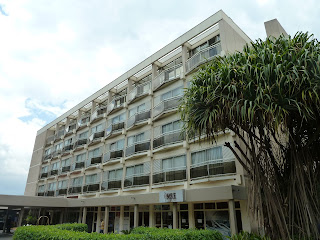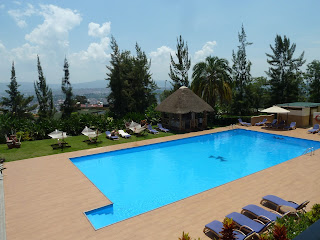There is more than enough to distract us from any thoughts of impending athletic glory during our visit of the North Korean capital over the following 36 hours, but there is a clearly discernible buzz amongst the runners. Like many of the other sports fanatics who have made the journey to this hermit state, I cannot help but relive one thousand childhood dreams of FA Cup Final appearances or leading any of my many countries of origin out onto the sporting field. And why not? Every dog has his day, after all, though in Korea this is more likely to be in the shape of a gourmet appetiser for a high-ranking military official.
An acclimatisation visit to the 1st of May Stadium on the eve of the race partly confirms some of our hopes and expectations: the stadium is an absolute beast, a colossal internal bowl of 150,000 seats flanked by sixteen stunning magnolia blossom shaped external arches, and for a second I wish I could attend the Mass Games for which the country is famed. It isn't until the following morning, however, when we are led into the athletes' preparation area and field access passage deep within the bowels of this gargantuan sporting arena, that we realise that something very special is about to happen. For once, the light at the end of the tunnel is very much literal rather than figurative, and all eyes and cameras are on the man holding the sign that announces my group as 'Amateur 1'. He is all that stands between us and North Korean stardom.
Then the moment arrives, a few minutes before the opening ceremony is due to start at 9am. Our bannerman moves forward and we walk out of the tunnel semi-darkness and onto an athletics track to the truly unforgettable, once-in-a-lifetime sight of 90,000 North Koreans warmly welcoming us into the world's biggest stadium to a background of rousing marching music. As athletes. The mass anticipation and nervous excitement from the tunnel are immediately replaced by collective shock, awe, disbelief and wonder as our jaws drop in the face of such extraordinary scenes. We gasp, we wave, we photograph. I drink in every single moment, aware as it is happening that I will never experience this feeling again in my lifetime. Words fail me completely and utterly.
We troop slowly around the track and onto the field in carbon copy choreography of an Olympic Games athlete nations' entrance parade, lining up behind our respective banners. To the right of the field, facing the DPRK top government and military officials, are the elite athletes: an Ethiopian, a Kenyan and two Zimbabweans representing the sport's traditional powerhouses; a predictably sizeable contingent from China and Russia; and the remainder and bulk of the professional athletes from the home nation. To the left of the field, theoretically facing the same local hierarchy but too busy committing this astonishing situation to digital posterity: a motley crew of one thousand international amateurs experiencing their fifteen minutes of sporting fame.
In the few moments of reflection that I have while my mind recovers from an unprecented bout of extreme sensory overload and before the race begins, I realise with great delight that these are memories that I will be able to relive and share, unusually. I may have been travelling around Africa by myself, but one of my oldest and dearest friends has flown from London to join me on this short escapade; three of my Antarctic co-adventurers have also made the journey, needing only the vaguest of suggestions on my part to reform our successful partnership. I am already looking forward to revisiting these very special moments at our next encounter, wherever that may be. With the marathon returning to the other stadium next year, we will bask in the knowledge that no other foreign athlete will ever have this experience, In the meantime, however, the sound of a starter pistol means that I have four hours of running ahead of me...
WATCH: My crappy video of our triumphant entrance into the stadium
Well hello, big boy...
Pre-race team photo
Waiting nervously in the tunnel
Waving to our adoring fans...
Lining up next to the elite athletes
4 hours later...
Mood song: Heroes - David Bowie
Mood food: raspberry energy gels













.jpg)
.jpg)